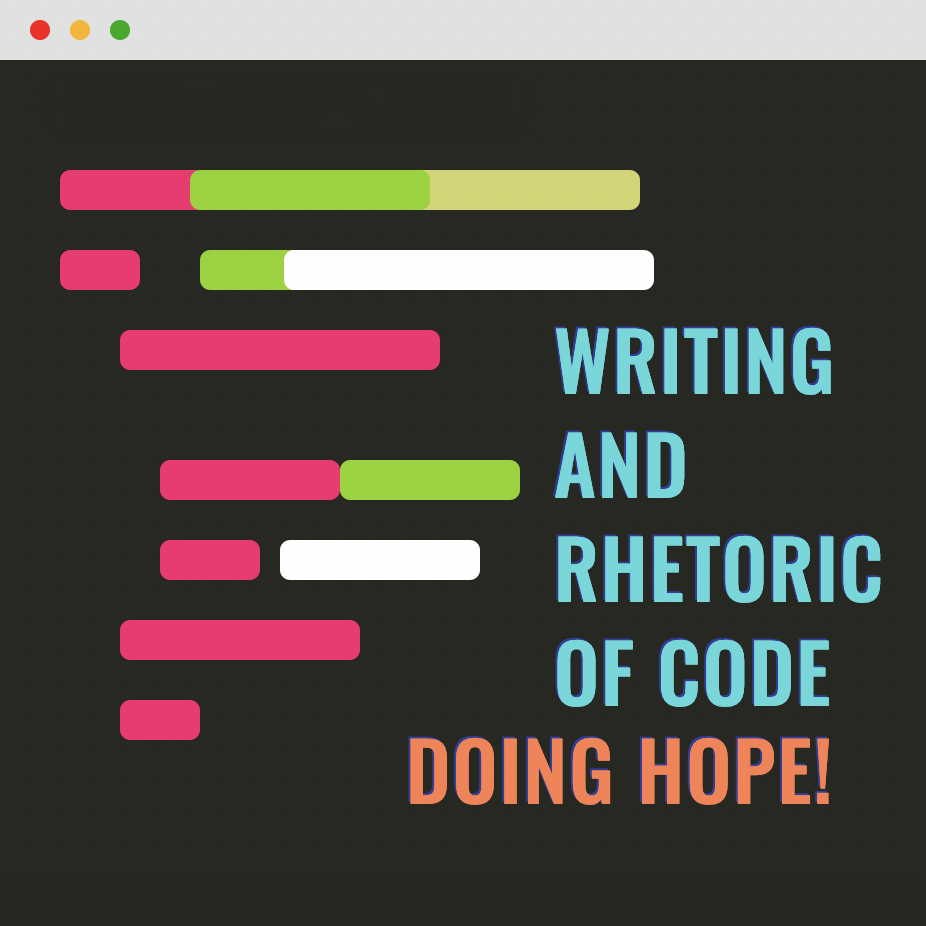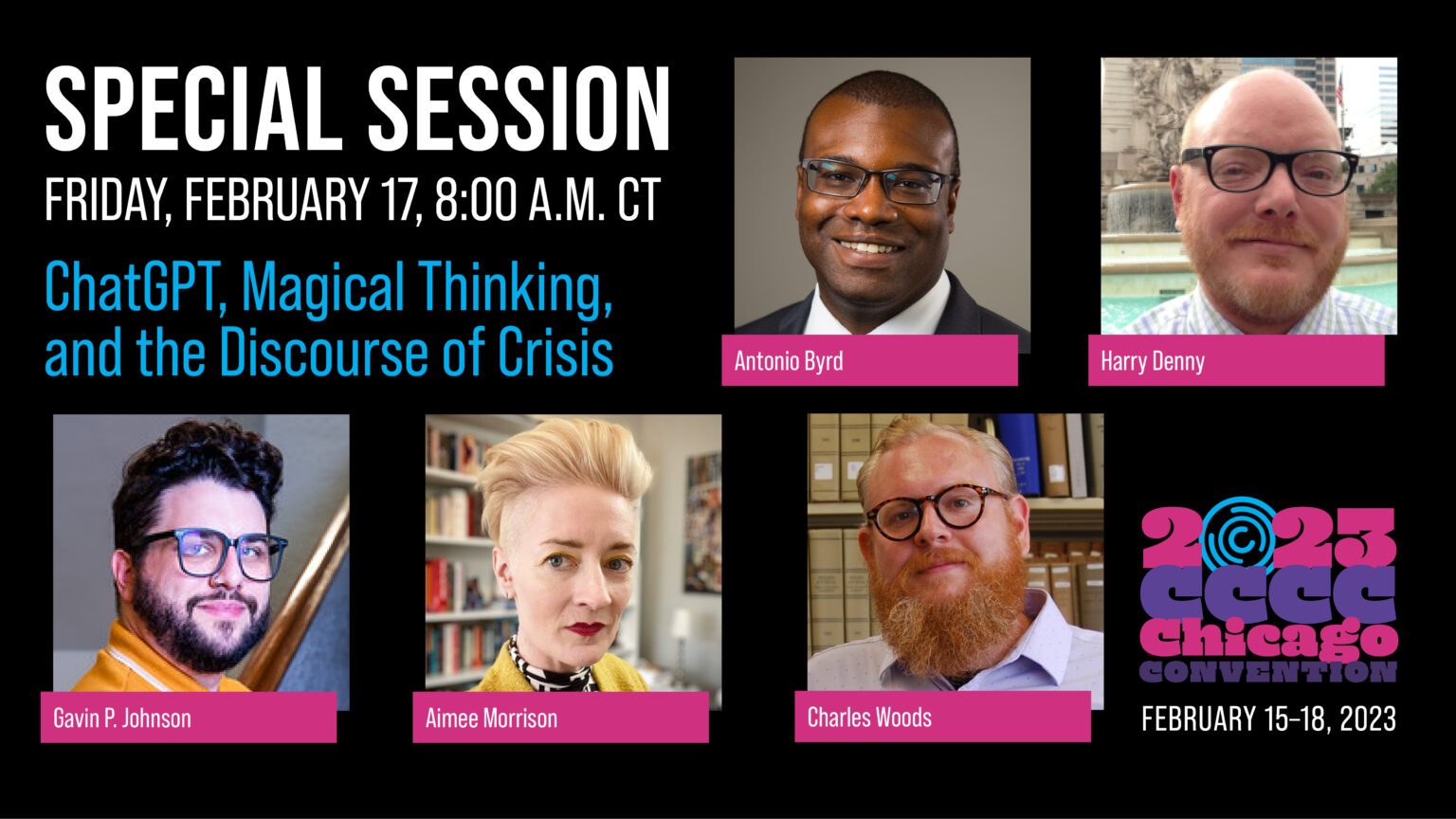
We put together a list of CCCC sessions that are related and relevant to SIGWROC.
Please contact either Chris Lindgren (lindgren@vt.edu) or Cara Marta Messina (cmessina@jsu.edu), if you’d like your panel added to the list.
We look forward to seeing you there!
FSIG.13 - SIGWROC Meeting—Doing Hope
- When: Friday, 3:30–4:30pm
- Location: Blvd. C (2nd floor)
Our meeting will use our time together to develop a statement of shared and foundational values and goals for “Doing Hope.” This statement will establish a socially-just precedent and commitment for what our scholarly work accomplishes in the world.
Awards
Congratulations to Anuj Gupta! Anuj is a recipient of the Scholars for the Dream Travel Award.
SIGWROC-Related Sessions at CCCC
THURSDAY - 02/16/23
D.22 Critical Responses to Online Learning Systems
These individual presentations offer critical assessment of online learning systems, and developing human response to them.
- Where: Room 4D (4th floor)
- When: Thursday, 3:15–4:30 p.m.
- Speakers:
- Hannah Hopkins, University of Texas at Austin, “Writing Back to Learning Management Systems: Data-Infrastructural Critiques of the LMS in the Writing Classroom”
- Laurence JOSE, Grand Valley State University, “Critical Digital Literacies: Creating Points of Intervention to Challenge the Tech WYSIWYG”
C.20 Imagining Better Futures: Critical Strategies and Frameworks for Institutional Change
This panel offers critical strategies for advancing institutional change across university and extramural settings.
- Where: Joliet (3rd floor)
- When: Thursday, 1:45–3:00 pm
- Pertinent Speaker: Maggie Fernandes, University of Arkansas, “Hope in Collective Complaint: Reading Digital Creator Complaints as Maps for Better Platform Futures”
E.12 Teaching with AI: Using Writing Generators in the Classroom
- When: Thursday, 4:45pm
- Speaker: Anna Mills
FRIDAY - 02/17/23
CCCC 2023 Special Session: ChatGPT, Magical Thinking, and the Discourse of Crisis

In this roundtable, experts in digital technologies, media, and literacies gather to discuss the rise of ChatGPT, its pedagogical implications, and the crisis-speak within and beyond the academy that attended its launch in the fall of 2022, along with its swift user uptake in the months since.
- Where: International Ballroom North, 2nd Floor, Hilton Chicago
- When: Friday, February 17, 8:00 a.m.
- Speakers:
- Antonio Byrd
- Harry Denny
- Gavin P. Johnson
- Aimee Morrison
- Charles Woods
F.15 Collaborative Teaching and New Approaches to STEM Learning
STEM students are more engaged if teachers demonstrate writing’s applicability to their career interests. This roundtable offers a variety of approaches involving collaboration, cross-disciplinary work, reflection, and data visualization that can help repair the relationship between our students’ STEM interests and their (often) negative experience of writing. Sponsored by the Writing and STEM Standing Group Committee
- Where: Astoria (3rd floor)
- When: Friday, 8:00–9:15 a.m.
- Speaker: Michelle Cowan, Texas Tech University, “Using Tableau to Teach Data Visualization”
F.11 Activating Hope with Rhetorical Action: A Grassroots Antiracist Workshop, Humor and Disgust on TikTok, and Data Literacy through Digital Power Projects
“One step forward, two steps back” is a disheartening cliché, but when social and political progress is stifled by doubling down to uphold the status quo, operating from hope can feel futile without taking action. This panel explores how particular online and offline communities enact hope through an antiracist narrative workshop, humor, and disgust on TikTok, as well as building data literacy.
- Where: Blvd. A (2nd floor)
- When: Friday, 8:00–9:15 a.m.
- Speakers:
- Hillary Coenen, Midwestern State University
- Desiree Dighton, East Carolina University
- Michael Faris, Texas Tech University
G.32 Teaching and Learning about Privacy and Surveillance: Doing Hope through the Digital Rhetorical Privacy Collective
This panel builds on interdisciplinary work within and beyond rhetoric and writing studies to introduce the Digital Rhetorical Privacy Collective, a digital resource for instructors who wish to incorporate intersectional learning about digital privacy and surveillance into their classrooms.
- Where: Room 4B (4th floor)
- When: Friday, 9:30–10:45am
- Speakers:
- Morgan Banville, East Carolina University
- Gavin Johnson, Texas A&M University-Commerce
- Charles Woods, Texas A&M University–Commerce
SATURDAY - 02/18/23
J.36 Troublemakers in Transdisciplinary Coding Communities
This panel examines four communities of coding literacy development. Looking to open-source creators and the writing classroom, these troublemakers dismantle gatekeeping, facilitate transdisciplinary collaboration, and embrace feminist praxis.
- Where: Room 4Q (4th floor)
- When: Saturday, 8:00–9:15 a.m.
- Speakers:
- Michael Black, University of Massachusetts Lowell, “The Contested Literacies of Software Modification”
- Brandee Easter, York University
- Elena Kalodner-Martin, University of Massachusetts Amherst, “When Computer Science Meets Composition: Fostering Transdisciplinary Literacies for Social Change”
- Cara Marta Messina, Jacksonville State University, “Code-Sharing and Documentation as Digital Feminist Praxis”
J.23 Introduction to Open Fuego and Basic Coding—Learn to Work with Code to Create Multimodal Webtexts and Publish Them on GitHub
This Engaged Learning Experience session will introduce participants to Open Fuego, a basic coding tool designed for the rhetoric and composition classroom (Quigley, 2022). The goal of this workshop is to introduce participants to the pedagogy of basic coding and give each a primer on how to use Open Fuego. Participants will also learn teaching best practices and sample assignment cycles.
- Where: Room 4K (4th floor)
- When: Saturday, 8:00–9:15 a.m.
- Speaker: Stephen Quigley, University of Pittsburgh
J.25 Computing between Languages and Mathematics: Technical and Professional Writing of Grace Murray Hopper and Winifred “Tim” Asprey”
Centering the 1960s friendship of Grace Murray Hopper and Winifred “Tim” Asprey, this paper reframes public advocacy for computers as technical and professional communication. Disagreeing about the value of formal writing instruction, their work is approached not only through public understandings of science—especially, computer science—but also public understandings of writing.
- Where: Lake Huron (8th floor)
- When: Saturday, 8:00–9:15 a.m.
- Speaker: Andrew Fiss, Michigan Technological University
M.32 Teaching Engaging Practices: Games, Music, and Multimodal Pedagogy
Speakers offer a diverse array of pedagogical practices to help writers engage the complexities of diversity, equity, and inclusion in and beyond the writing classroom.
- Where: Room 4F (4th floor)
- When: Saturday, 12:30–1:45 pm
- Speakers:
- AC Carlson, Indiana University-Bloomington, “Gamespace: Doing (Playful) Hope in the Classroom”
- Oscar Garcia, University of Massachusetts Amherst, “Seeking Rhetorical Attunement Convergence of Multilingual and Multimodal in STROL—How Multimodal Pedagogy Diverted from the Race Question”